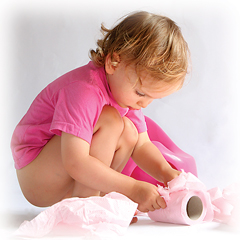Q:
I am blessed to be married to a man who is a fantastic father. I have trouble admitting this to anyone, but I’m jealous. It seems like Mom is always the heavy at our house. How do I get past this?
A.:
You are in good company! Don’t feel embarrassed. Many parents share your feelings. Feeling envious of the kid-popular parent is a normal response for the lonely leader. And trust me, it works both ways. Sometimes Dad is the heavy.
So could you demand that your husband stop being the perennial good guy and change his ways? Sure, but you’d probably lose the much-needed balance he brings to your team effort. And you would sacrifice the joy your partner brings to the general climate of your home environment. So, rather than focus on changing him as a parent, let’s focus on changing your perception of your own role.
Parenting is all about self-sacrifice. In order to give your children the gift of having your spouse as their father, you must put your own needs away for a little while. By not making this about you, but rather, making it about joyfully giving your children the gift of a vibrant, happy father, you are becoming the selfless parent each of us is called to be. It is this generosity of spirit and yes, silent suffering, that will draw your children to you. It will truly be your joy as a mother, watching them be loved by a man who is thriving in his role as a parent.
It’s also likely that your children will respect and appreciate this as they come to understand it. Refusing to allow your envy to manipulate the children’s relationship with their father might be the most charitable and loving thing you will ever do for them. Because, after all, the wise and mature parent knows it’s just not about you. It’s about them.
 Q:
Q:
How do you feel about pull-ups? I potty trained my first child without them and five years later, everyone is saying they make the process much easier. Thoughts?
A:
They can indeed make the process easier – for you, but for your child? Not so much.
There are a number of reasons I am not a fan of using pull-ups to toilet train a child.
Becoming toilet trained is a critical part of the social-emotional development of a toddler. It is not at all just about learning to use the toilet. It is about relationships, with you, as well as the relationship your toddler is developing with himself.
Using the toilet is a skill of self-reliance. Other skills of self-reliance in a very young child include lulling himself to sleep and sucking for self-soothing. These skills are vital to developing a healthy self-regard, as they make our children feel competent. And a competent, capable child feels confident in himself. In addition, when the child’s parent understands the importance of these skills of self-reliance, that parent is more likely to encourage the development of these skills in a timely manner, not allowing the child’s reluctance to diminish the opportunity for personal growth. This makes the child’s parent a strong leader, one that a child will be more willing to listen to and attend to in the future.
The parent should understand that when the child fails to develop certain skills of self-reliance when the developmental time has arrived to do so, that child is thrust forward in his development missing key skills that encourage his social and emotional wellbeing, most especially the self-regard that is born from a sense of competence.
Simply put, pull-ups slow this entire process down by thrusting the child into the next stage of development without a critical skill. Even for young children, this dynamic also generates a lot of doubt in the child about his parent’s leadership.
And, there’s more! At the time toilet training should be occurring, the toddler is a very rigid little guy. This inflexibility is your toddler’s way of securing some control for himself. The very young child becomes obsessed with the familiar and distressed over deviations from routine. Therefore, while you intend the pull-up to be a helpful tool in the toilet-training transition, your child becomes very attached to the pull-up. The transitional object becomes counter-productive because the child now has one more thing to adapt to when the pull-ups are removed from the process.
It is the parent’s responsibility to toilet train a child at the correct developmental time (experts recommend between two and two-and-a-half) recognizing this difficult transition as part of the development of a positive self-image in the child. It’s supposed to be hard. It is through challenge that we grow. And the opportunities for growth – for both parent and child – should never be delayed or have their corners cut.




